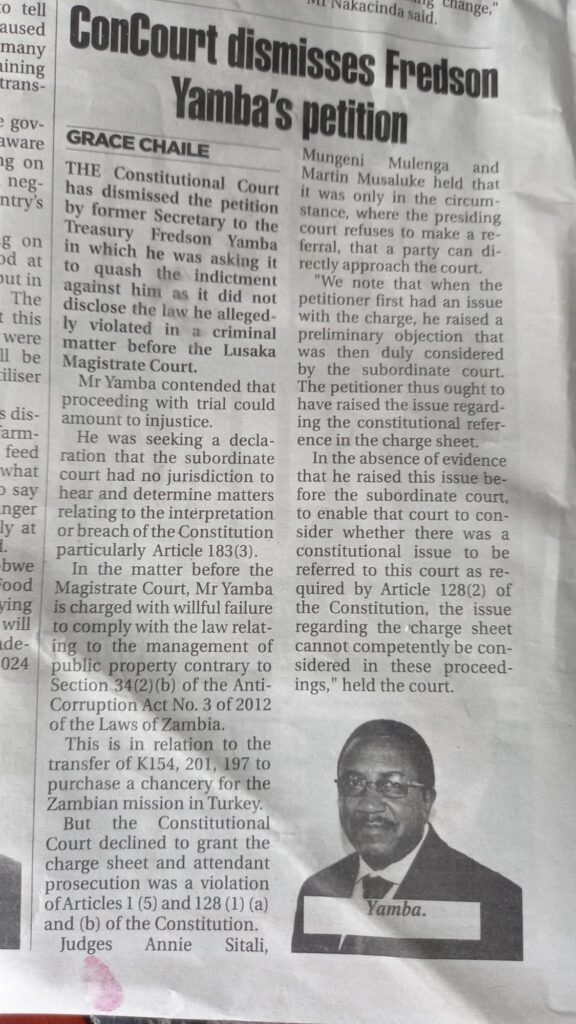By Peter Sinkamba
WHY I HAVE A PROBLEM WITH CONCOURT: INCOHERENCE
Our Constitutional Court continues to amaze me. Since its establishment in 2016, I find most of the decisions it has made really perplexing.
I wonder whether the judges make decisions under undue political pressure or what. One need not be a constitutional lawyer to note glaring incoherence in most of the judges’ decisions.
I am looking at the case where Concourt has dismissed the petition by former Secretary to the Treasury Fredson Yamba, in which he asked the court to quash the indictment against him on account that it includes constitutional issues which the subordinate court lacks jurisdiction to determine.
Mr. Yamba contended that proceeding with trial could amount to injustice.
Specifically, M. Yamba had an issue with the inclusion of Article 183 in the particulars of the offence. He contended that the inclusion of breach of the Constitution in the charge sheet rendered the subordinate court incompetent to hear the matter because that court lacks jurisdiction to interpret or determine breaches, violations, or contraventions of the Constitution.
He contended further that the Constitution grants the Constitutional Court original and final jurisdiction to interpret the Constitution and determine whether the Constitution has been breached or not.
But, the Concourt declined to grant that the charge sheet and attendant prosecution was a violation of Article 1(5) and 128(1)(a) and (b) of the Constitution.
Passing judgment, the Concourt ruled that Mr. Yamba should have raised the issue of constitutional reference in the charge sheet at the subordinate court.
“We note that when the petitioner first had an issue with the charge, he raised a preliminary objection that was then duly considered by the subordinate court. The petitioner thus ought to have raised the issue regarding the constitutional reference in the charge sheet.
“In the absence of evidence that he raised the issue of constitutional reference before the subordinate court, to enable that court to consider whether there was a constitutional issue to be referred to this court, as required by Article 128(2) of the Constitution, the issue regarding the charge sheet cannot be competently considered in these proceedings,” the Concourt held.
To be clear, Article 1(5) of the Constitution provides as follows:
“A matter relating to this Constitution shall be heard by the Constitutional Court.”.
Furthermore, Article 128(2) of the Constitution provides as follows:
“Subject to Article 28(2), where a question relating to this Constitution arises in a court, the person presiding in that court shall refer the question to the Constitutional Court.”.
My understanding of Article 128(2), cited above, is that reference to Concourt, of a question by the person presiding in a court, is not an appeal. Rather, it is merely a procedural issue. Simply a reference.
In other words, the Concourt has the power to hear the Yamba case for the first time since Atticle 128(2) does not confer appellate jurisdiction onto Concourt. Appellate jurisdiction is the authority to review a decision from a lower court. Reference is not an appeal.
Put differently, a court exercising original jurisdiction is the first court to hear the case, whereas appellate jurisdiction refers to the power to review the decisions of other courts that have already issued rulings in a given case.
In my view, Article 128(2) of the Constitution does not confer jurisdiction on the Magistrate Court to issue a ruling as to whether Article 183, that is stated in the charge sheet for Mr. Yamba is a constitutional matter or not.
But, since the Concourt has the last say on constitutional matters (apart from Bill of Rights issues), Mr. Yamba will have no option but to go back to the Magistrate Court to ask the Magistrate to refer the matter to Concourt. If the Magistrate refuses, then Mr. Yamba may have to appeal to the Concourt and present the same arguments. If the Magistrate does not refuse but simply refer to the matter, the Concourt will hear the same arguments anyway.
What a waste of time and resources! Going round in circles!
When I reflect on the Yamba case, I wonder why we have Article 118(2)(b) and (e) in the Constitution.
Article 118(2) provides as follows:
“In excersizing judicial authority, the courts shall be guided by the following principles…
(b) justice shall not be delayed
(e) justice shall be administered without undue regard to procedural technicalities
Since its establishment in 2016, I have had a very big problem with the Concourt’s decisions on constitutional matters brought before it. The court appears to suffer from an inherent problem of incoherence. It was actually for this reason, that in 2016, I did file a complaint at the Judicial Complaints Commission (JCC) for the removal of the entire bench for incompetence and gross misconduct concerning the manner in which the bench handled the presidential petition. Almost a decade later, we still have the same circus in the Concourt!


I agree with Mr. Sinkamba that most if not all judgements made by the concourt don’t make sense at all. If anything they create more questions than answers. Concourt judges need to pull up their sock start making sound judgements.